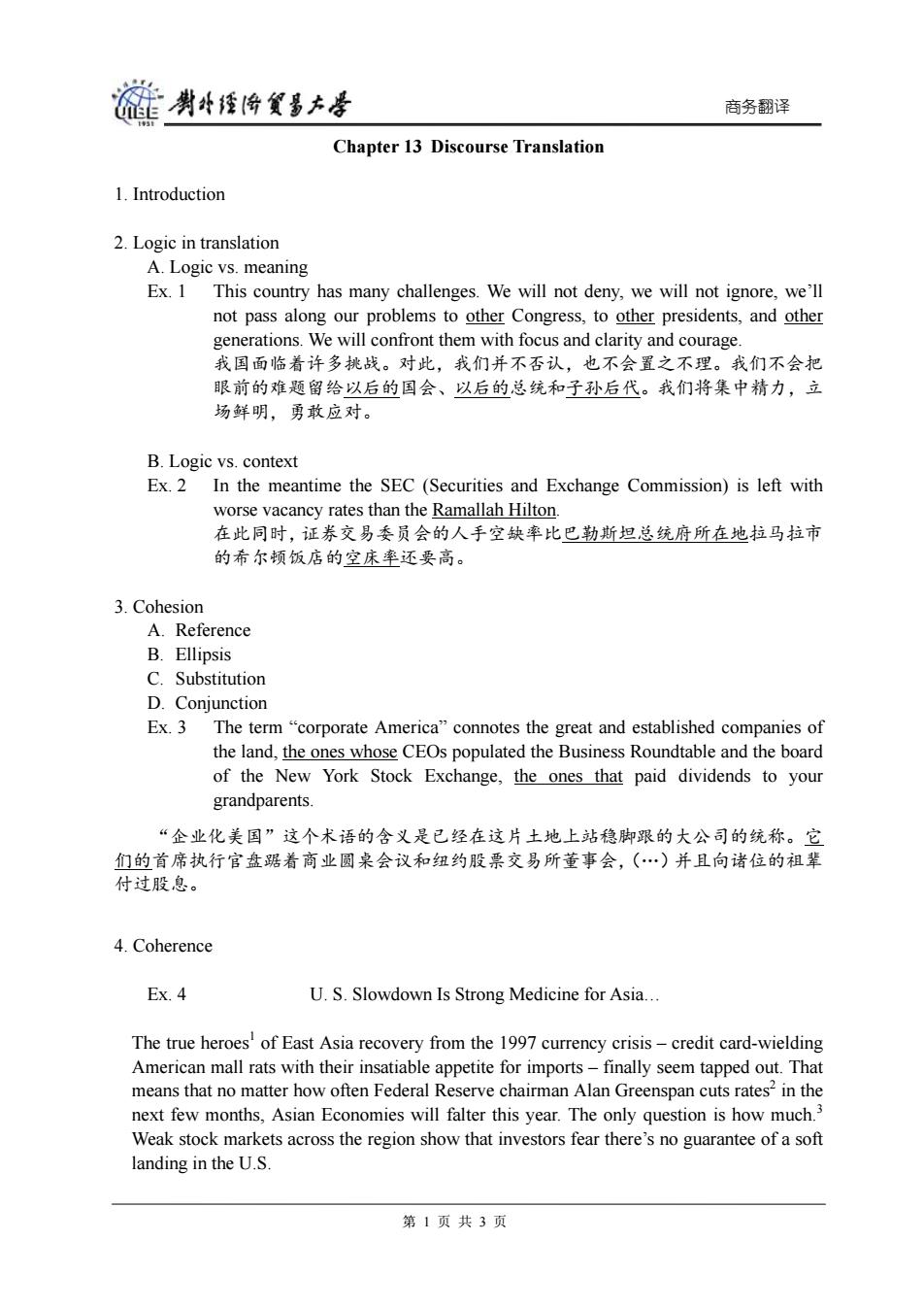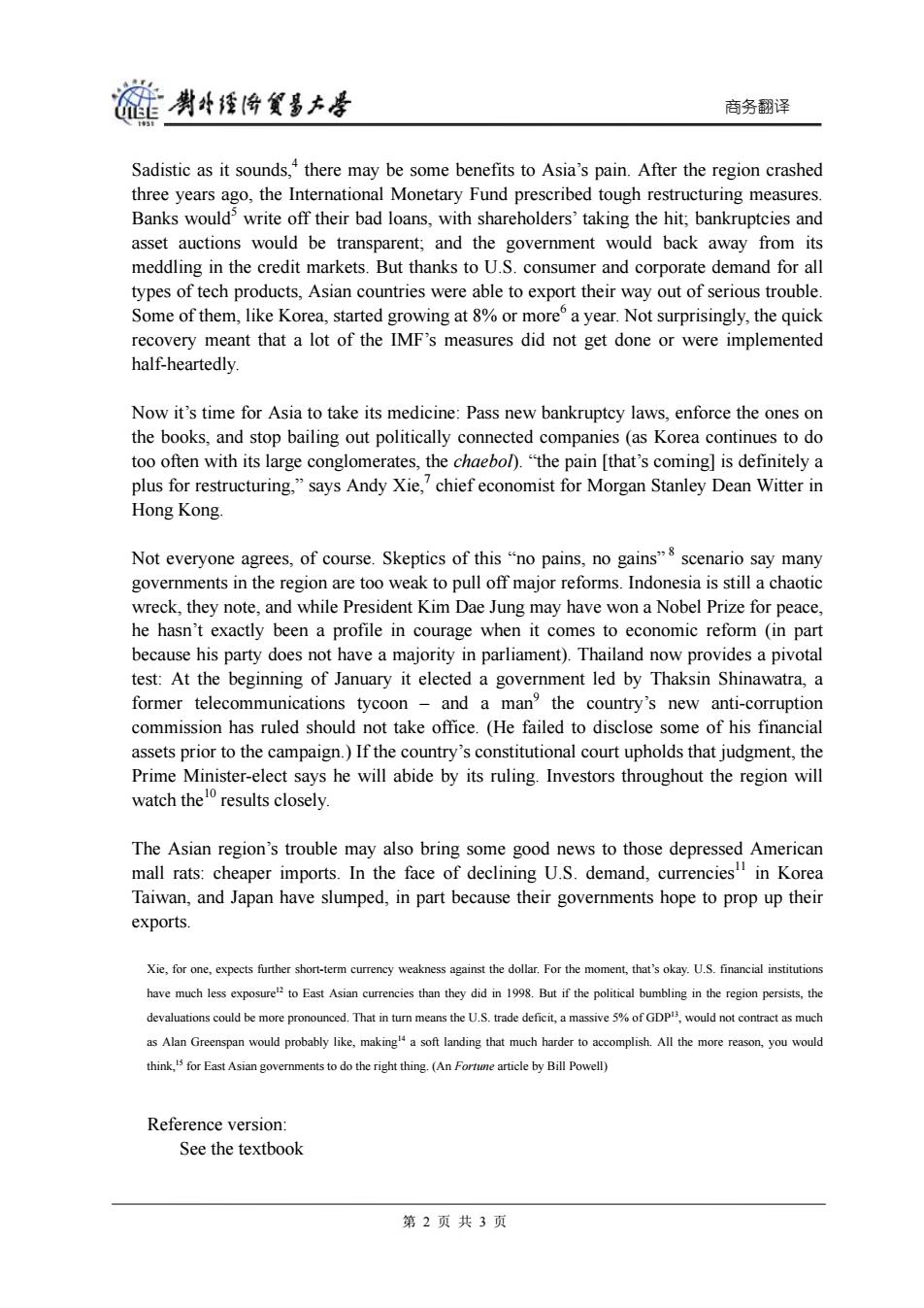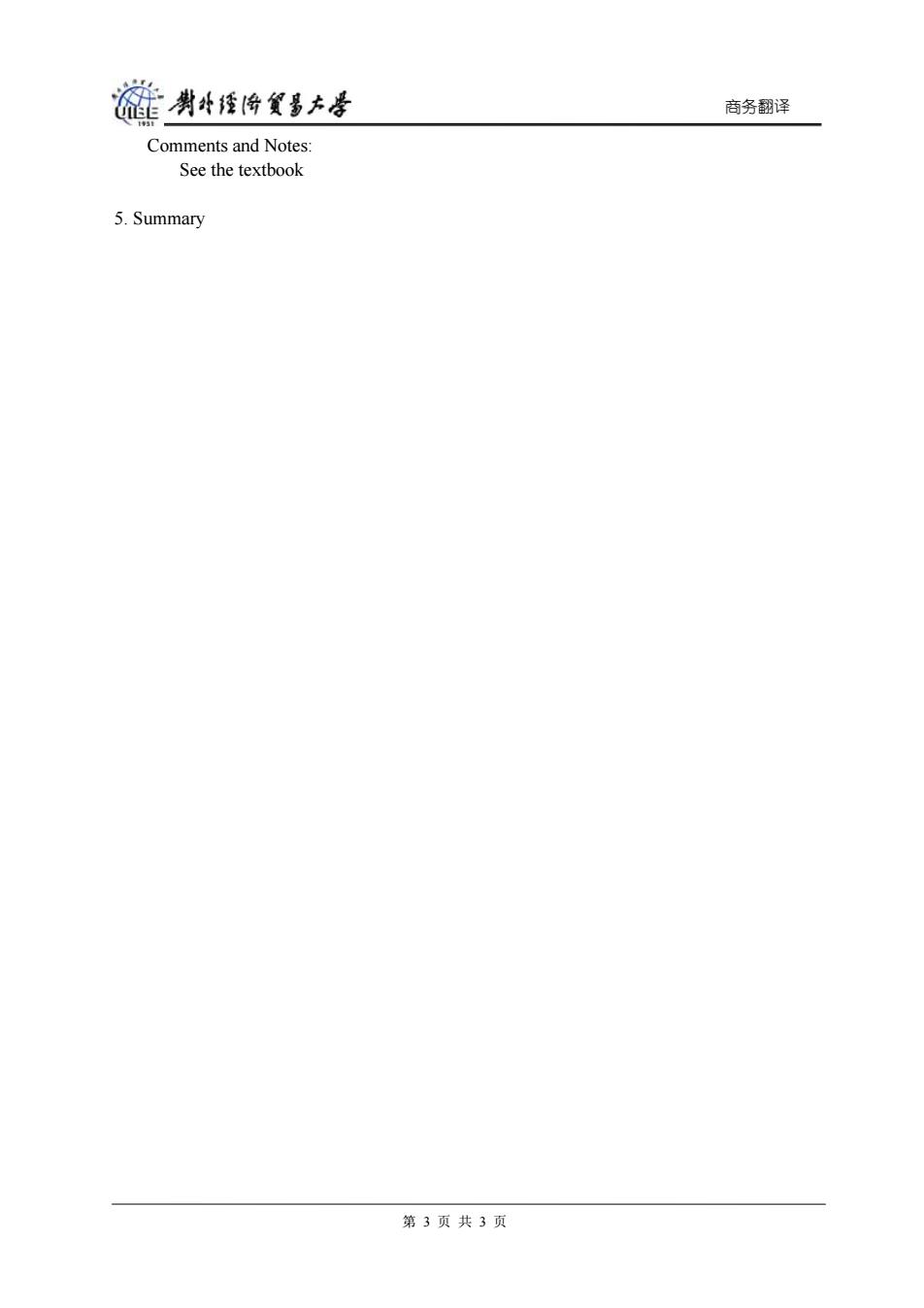
裢喇外降餐多大岸 商务翻译 Chapter 13 Discourse Translation 1.Introduction 2.Logic in translation A.Logic vs.meaning Ex.1 This country has many challenges.We will not deny,we will not ignore,we'll not pass along our problems to other Congress,to other presidents,and other generations.We will confront them with focus and clarity and courage. 我国面临着许多挑战。对此,我们并不否认,也不会置之不理。我们不会把 眼前的难题留给以后的国会、以后的总统和子孙后代。我们将集中精力,立 场鲜明,勇敢应对。 B.Logic vs.context Ex.2 In the meantime the SEC(Securities and Exchange Commission)is left with worse vacancy rates than the Ramallah Hilton. 在此同时,证券交易委员会的人手空缺率比巴勒斯坦总统府所在地拉马拉市 的希尔顿饭店的空床率还要高。 3.Cohesion A.Reference B.Ellipsis C.Substitution D.Conjunction Ex.3 The term "corporate America"connotes the great and established companies of the land,the ones whose CEOs populated the Business Roundtable and the board of the New York Stock Exchange,the ones that paid dividends to your grandparents “企业化美国”这个术语的含义是已经在这片土地上站稳脚跟的大公司的统称。它 们的首席执行官盘踞着商业圆桌会议和纽约股票交易所董事会,(…)并且向诸位的祖辈 付过股息。 4.Coherence Ex.4 U.S.Slowdown Is Strong Medicine for Asia... The true heroes'of East Asia recovery from the 1997 currency crisis-credit card-wielding American mall rats with their insatiable appetite for imports-finally seem tapped out.That means that no matter how often Federal Reserve chairman Alan Greenspan cuts rates?in the next few months,Asian Economies will falter this year.The only question is how much.3 Weak stock markets across the region show that investors fear there's no guarantee of a soft landing in the U.S. 第1页共3页
商务翻译 Chapter 13 Discourse Translation 1. Introduction 2. Logic in translation A. Logic vs. meaning Ex. 1 This country has many challenges. We will not deny, we will not ignore, we’ll not pass along our problems to other Congress, to other presidents, and other generations. We will confront them with focus and clarity and courage. 我国面临着许多挑战。对此,我们并不否认,也不会置之不理。我们不会把 眼前的难题留给以后的国会、以后的总统和子孙后代。我们将集中精力,立 场鲜明,勇敢应对。 B. Logic vs. context Ex. 2 In the meantime the SEC (Securities and Exchange Commission) is left with worse vacancy rates than the Ramallah Hilton. 在此同时,证券交易委员会的人手空缺率比巴勒斯坦总统府所在地拉马拉市 的希尔顿饭店的空床率还要高。 3. Cohesion A. Reference B. Ellipsis C. Substitution D. Conjunction Ex. 3 The term “corporate America” connotes the great and established companies of the land, the ones whose CEOs populated the Business Roundtable and the board of the New York Stock Exchange, the ones that paid dividends to your grandparents. “企业化美国”这个术语的含义是已经在这片土地上站稳脚跟的大公司的统称。它 们的首席执行官盘踞着商业圆桌会议和纽约股票交易所董事会,(…)并且向诸位的祖辈 付过股息。 4. Coherence Ex. 4 U. S. Slowdown Is Strong Medicine for Asia… The true heroes1 of East Asia recovery from the 1997 currency crisis – credit card-wielding American mall rats with their insatiable appetite for imports – finally seem tapped out. That means that no matter how often Federal Reserve chairman Alan Greenspan cuts rates2 in the next few months, Asian Economies will falter this year. The only question is how much.3 Weak stock markets across the region show that investors fear there’s no guarantee of a soft landing in the U.S. 第 1 页 共 3 页

链男垤降贸多大是 商务翻译 Sadistic as it sounds,there may be some benefits to Asia's pain.After the region crashed three years ago,the International Monetary Fund prescribed tough restructuring measures. Banks would'write off their bad loans,with shareholders'taking the hit;bankruptcies and asset auctions would be transparent;and the government would back away from its meddling in the credit markets.But thanks to U.S.consumer and corporate demand for all types of tech products,Asian countries were able to export their way out of serious trouble Some of them,like Korea,started growing at 8%or more a year.Not surprisingly,the quick recovery meant that a lot of the IMF's measures did not get done or were implemented half-heartedly. Now it's time for Asia to take its medicine:Pass new bankruptcy laws,enforce the ones on the books,and stop bailing out politically connected companies (as Korea continues to do too often with its large conglomerates,the chaebol)."the pain [that's coming]is definitely a plus for restructuring,"says Andy Xie,'chief economist for Morgan Stanley Dean Witter in Hong Kong. Not everyone agrees,of course.Skeptics of this"no pains,no gains"scenario say many governments in the region are too weak to pull off major reforms.Indonesia is still a chaotic wreck,they note,and while President Kim Dae Jung may have won a Nobel Prize for peace, he hasn't exactly been a profile in courage when it comes to economic reform (in part because his party does not have a majority in parliament).Thailand now provides a pivotal test:At the beginning of January it elected a government led by Thaksin Shinawatra,a former telecommunications tycoon -and a man?the country's new anti-corruption commission has ruled should not take office.(He failed to disclose some of his financial assets prior to the campaign.)If the country's constitutional court upholds that judgment,the Prime Minister-elect says he will abide by its ruling.Investors throughout the region will watch the results closely. The Asian region's trouble may also bring some good news to those depressed American mall rats:cheaper imports.In the face of declining U.S.demand,currenciesl in Korea Taiwan,and Japan have slumped,in part because their governments hope to prop up their exports. Xie,for one,expects further short-term currency weakness against the dollar.For the moment,that's okay.U.S.financial institutions have much less exposure to East Asian currencies than they did in 1998.But if the political bumbling in the region persists,the devaluations could be more pronounced.That in turn means the U.S.trade deficit,a massive 5%of GDP3,would not contract as much as Alan Greenspan would probably like,making'a soft landing that much harder to accomplish.All the more reason,you would think,for East Asian governments to do the right thing.(An Fortue article by Bill Powell) Reference version: See the textbook 第2页共3页
商务翻译 Sadistic as it sounds,4 there may be some benefits to Asia’s pain. After the region crashed three years ago, the International Monetary Fund prescribed tough restructuring measures. Banks would5 write off their bad loans, with shareholders’ taking the hit; bankruptcies and asset auctions would be transparent; and the government would back away from its meddling in the credit markets. But thanks to U.S. consumer and corporate demand for all types of tech products, Asian countries were able to export their way out of serious trouble. Some of them, like Korea, started growing at 8% or more6 a year. Not surprisingly, the quick recovery meant that a lot of the IMF’s measures did not get done or were implemented half-heartedly. Now it’s time for Asia to take its medicine: Pass new bankruptcy laws, enforce the ones on the books, and stop bailing out politically connected companies (as Korea continues to do too often with its large conglomerates, the chaebol). “the pain [that’s coming] is definitely a plus for restructuring,” says Andy Xie,7 chief economist for Morgan Stanley Dean Witter in Hong Kong. Not everyone agrees, of course. Skeptics of this “no pains, no gains” 8 scenario say many governments in the region are too weak to pull off major reforms. Indonesia is still a chaotic wreck, they note, and while President Kim Dae Jung may have won a Nobel Prize for peace, he hasn’t exactly been a profile in courage when it comes to economic reform (in part because his party does not have a majority in parliament). Thailand now provides a pivotal test: At the beginning of January it elected a government led by Thaksin Shinawatra, a former telecommunications tycoon – and a man9 the country’s new anti-corruption commission has ruled should not take office. (He failed to disclose some of his financial assets prior to the campaign.) If the country’s constitutional court upholds that judgment, the Prime Minister-elect says he will abide by its ruling. Investors throughout the region will watch the10 results closely. The Asian region’s trouble may also bring some good news to those depressed American mall rats: cheaper imports. In the face of declining U.S. demand, currencies11 in Korea Taiwan, and Japan have slumped, in part because their governments hope to prop up their exports. Xie, for one, expects further short-term currency weakness against the dollar. For the moment, that’s okay. U.S. financial institutions have much less exposure 12 to East Asian currencies than they did in 1998. But if the political bumbling in the region persists, the devaluations could be more pronounced. That in turn means the U.S. trade deficit, a massive 5% of GDP13, would not contract as much as Alan Greenspan would probably like, making14 a soft landing that much harder to accomplish. All the more reason, you would think,15 for East Asian governments to do the right thing. (An Fortune article by Bill Powell) Reference version: See the textbook 第 2 页 共 3 页

旋剥经降贸多去号 商务翻译 Comments and Notes: See the textbook 5.Summary 第3页共3页
商务翻译 Comments and Notes: See the textbook 5. Summary 第 3 页 共 3 页